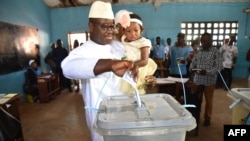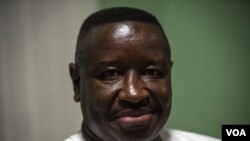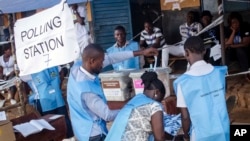Sierra Leone's main opposition party took a slight lead in the country's presidential race with 75 percent of votes counted. But with outright victory still out of reach, the candidates are now looking to form possible coalitions in the likely event of a runoff election.
The Sierra Leone People's Party (SLPP) candidate, retired Gen. Julius Maada Bio, holds 43.3 percent of the vote, edging in front of the ruling All People's Congress (APC) party candidate, former foreign minister Samura Kamara, who garnered 42.6 percent of the ballots counted so far.
A candidate needs 55 percent to win in the first round.
Over 3 million people registered to vote in the election, which took place last Wednesday, and is one of the closest in the West African country's history. Current President Ernest Bai Koroma of the APC must step down after serving two terms.
APC ran on a track record of infrastructure development, while SLPP and other opposition parties have promised change. APC has been accused of corruption and mishandling the response to the 2014 Ebola outbreak and a 2017 landslide, which together killed thousands of Sierra Leoneans.
The National Electoral Commission (NEC) said final results will be released before Wednesday but said recounts are underway in 82 polling stations across the country because some vote count forms had been printed without serials numbers. Lack of serial numbers had led to complaints from party agents monitoring the counting.
"For us to provide assurance, we informed all our district offices and regional tally centers that such recounts should be done, and we are starting today. And we are expecting to be finished by midday tomorrow," Davis said at a press conference Sunday.
Davis said they are also investigating alleged cases of ballot stuffing and overvoting. He attributed overvoting incidents to technical errors in the counting process.
While the vote count wraps up, political parties are starting to look ahead to what looks almost certainly to be a runoff between SLPP's Bio and APC's Kamara.
To win a runoff, a candidate needs a simple majority, so both leading candidates will try to pull votes from some of the 14 other candidates who collectively hold 14.1 percent of the counted ballots.
In particular, two of those smaller candidates may emerge as kingmakers.
The National Grand Coalition's Kandeh Yumkella, a former U.N. official, has won 7 percent of the ballots counted so far. Former Vice President Samuel Sam-Sumana of the Coalition for Change (C4C) has taken 3.4 percent.
But both Yumkella and Sam-Sumana have complicated relationships with the bigger parties.
Sam-Sumana, who holds sway in the country's east, had a bitter falling out with the APC when he was ousted from the party and sacked from the vice presidency in 2015.
Yumkella, meanwhile, was a member of the SLPP, but broke away to form the NGC last year. Yet, Yumkella also is at odds with the APC over the ruling party's backing of a court case against his candidacy, said Andrew Lavali, executive director of the Sierra Leone-based Institute for Governance Reform.
Lavali said the SLPP may be the more attractive option for the two smaller parties' supporters.
"Given the history of grievances between Kandeh Yumkella and the ruling APC at the moment, and the history between the ruling party and Sam-Sumana, it is likely that supporters of these two third and fourth parties will come in with the opposition [SLPP]," Lavali told VOA.
SLPP Secretary General Umaru Napoleon Koroma told VOA they are ready to capitalize on discontent with the ruling party, and in the event of a runoff, they will "definitely" strike a coalition with the smaller parties.
"The collective opposition voted against the APC," he told VOA. "It is clear the people of this country don't want APC anymore."
Abu Daramy, a spokesman for the APC, told VOA they are still holding out for a first round win. He said they may reach 55 percent when all irregularities are smoothed out.
But he also said the APC is talking with other parties and would try to form a runoff coalition if that "is the will of the people and the will of the government."
For now, NGC and C4C have not made any public declarations of their plans. NGC spokesman Julius Spencer said party officials have held internal discussions about joining a coalition during a runoff, but no decision would be made until after all votes are counted.
C4C spokesman Lawrence Coker did not respond to VOA's requests for comment.







